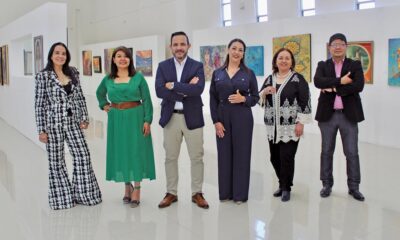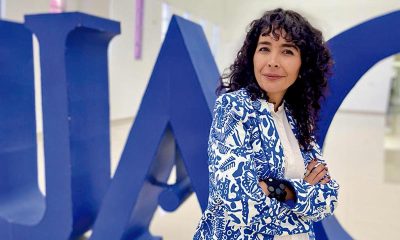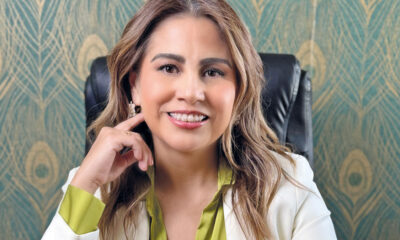El Diván
Cambia la vida de los más vulnerables
Publicado
2 años antesel
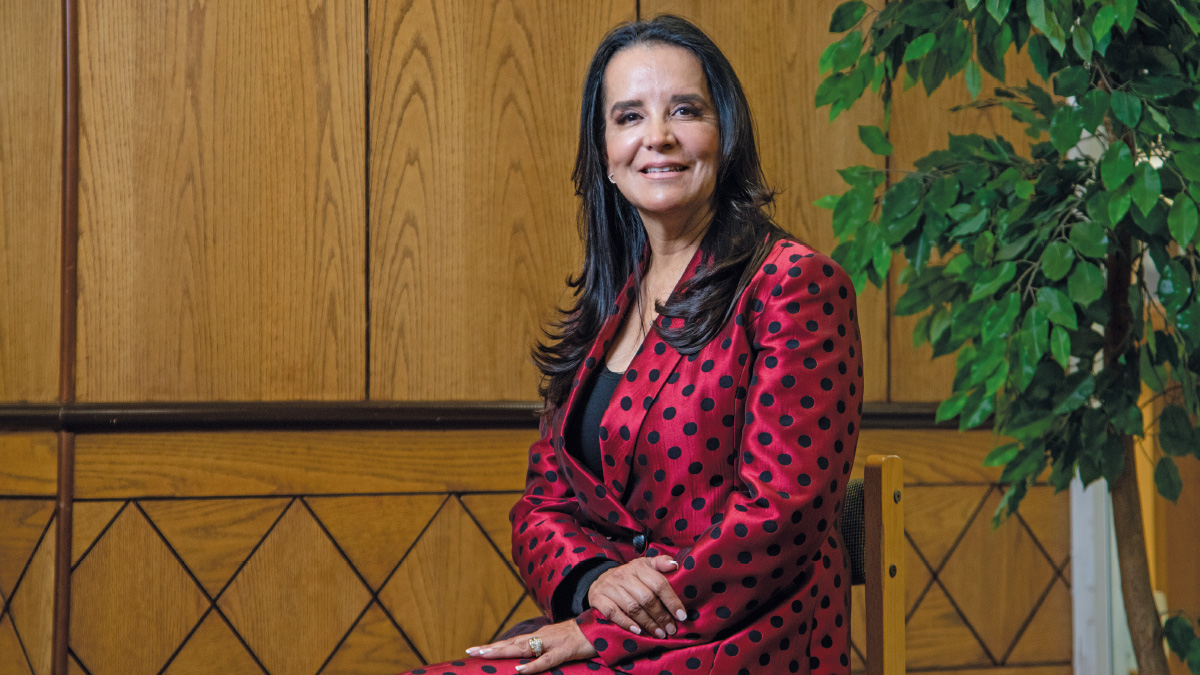
A través de la UACJ, durante 40 años Gaby Acosta se ha dedicado a llevar programas de ayuda a las zonas más necesitadas de Juárez
“Una mujer que no tiene límites, una mujer que ve más allá de los obstáculos, que puede resolver problemáticas y que tiene todo por delante”, es la descripción que hace Gaby Acosta de una mujer visionaria, un concepto en el que sin duda ella misma cabe.
Gabriela Acosta Camacho, es una trabajadora social de profesión que a lo largo de 40 años ha estado inmiscuida en los asuntos de la Universidad Autónoma de Ciudad Juárez (UACJ), su alma mater e institución que le ha dado la oportunidad, no sólo de ser su representante ante otras instituciones o dependencias importantes, sino de ayudar a quienes más lo necesitan.
Gaby nació en la Ciudad de México y desde muy pequeña vino a vivir a esta frontera, donde fue parte del Colegio Latinoamericano Teresiano. “Fue una etapa muy bonita de mi vida que me marcó definitivamente para posteriormente escoger esta carrera (Trabajo Social)… en el Teresiano nos inculcaron el amor al prójimo”, nos comparte quien creció dentro de un entorno familiar muy unido y que ahora es madre de dos hijas, Sophia y Regina.
La universidad, un nuevo comienzo
Fue por lo anterior que a la hora de elegir una carrera, sin dudarlo, Gaby decidió por Trabajo Social, donde conoció la “parte sensible del ser humano”, comenta.
Fue por su interés y ganas de comenzar a ayudar que en 1983 la universidad le dio la oportunidad de trabajar en la planta docente de la misma, impartiendo materias como comunidad. También fue investigadora de medio tiempo y posteriormente asistente académico-administrativa.
Acosta Camacho, quien tiene una especialidad en terapia del habla, actualmente imparte la clase de dinámicas y técnicas de grupo.
Sin embargo, no todo ha ocurrido dentro de un salón de clases, en estos 40 años, Gaby representó a la UACJ en la Ciudad de México, donde se encargó de coordinar, ser enlace y gestora ante dependencias federales e instancias de educación superior como la SEP, Conacyt, Anuies, Conade, UNAM, ITAM, UAM, entre otras.
“Yo tuve otra visión de lo que era realmente la universidad, tuve la posibilidad de realizar varias gestiones ante dependencias de educación superior, de gobierno”, agrega.
Cercana a la comunidad
A su regreso a esta ciudad siguió apoyando a la escuela, pero ahora como coordinadora general de Relaciones Públicas, trabajo que realizó durante dos administraciones; en ese lapso uno de sus logros fue el traslado de bibliotecas completas a esta frontera, entre ellas la de Carlos Montemayor, también gestionó las ventas de los libros de la UACJ en librerías de prestigio.
“Creo que Dios me colocó en el lugar en el que yo tenía que estar”, menciona.
Actualmente, se sigue desarrollando desde la subdirección de Servicio Social y Acción Comunitaria de la dirección general de Extensión y Servicios Estudiantiles de la UACJ, donde tiene la oportunidad de realizar y coordinar junto con estudiantes del área de servicio social proyectos de acercamiento con las comunidades más vulnerables y necesitadas de la ciudad.
A estas comunidades llevan brigadas multidisciplinarias, donde ofrecen servicios de salud, educativos y culturales. Acercan ferias de salud a primarias y secundarias ubicadas en zonas marginadas e imparten pláticas informativas de temas de prevención de bullying, conducta y valores.
También reúnen a los menores en círculos de lectura, en los que tratan de mejorar su comprensión, gusto y cultura. Destinan programas de aprovechamiento académico por medio de asesorías de matemáticas a menores, y se comprometen en prevención de la deserción escolar de los mismos, motivando su desarrollo académico para en el futuro lograr ser universitarios.
Asimismo, en el tema de migración, coordina programas de ayuda humanitaria y acciones sociales, culturales, deportivas y de salud para las personas en situación de movilidad.
“Con un granito de arena hemos notado grandes cambios, la verdad es que ya son muchos años; 40 años dentro de esta institución y aún me dan ganas de seguir trabajando, siempre vamos descubriendo nuevos problemas, estos nunca terminan… nosotros cada día nos preparamos más, nos fortalecemos más para poder ayudar a toda la gente que nos necesita”, dice Gaby emocionada.
Rotaria de corazón
Pero no todo acaba aquí, nuestra entrevistada desde hace varios años también es una destacada miembro de la familia rotaria, a la cual ingresó como rotariana tras casarse con Jorge Mario Quintana Silveyra, quien ya pertenecía al club social.
Después presidió el Comité de Damas Juárez Oriente y actualmente es integrante del Club Juárez Conecta Transforma, con el que realiza actividades de voluntariado para apoyar a personas vulnerables, “cambiamos vidas”, menciona Gaby, para quien al parecer no es suficiente pues afirma que le gustaría “trabajar más por Ciudad Juárez”, para lo cual no se suelta de la mano de Dios.
“Sin Dios no soy nada, es mi fuerza, es mi motivación, es mi día a día, él es el que me ha guiado, me ha permitido, me ha dado la salud para hacer todo lo que hago, él es todo para mí”, concluye la mujer que en cuatro décadas de trayectoria ha logrado cambiar la vida de cientos de personas en esta frontera.
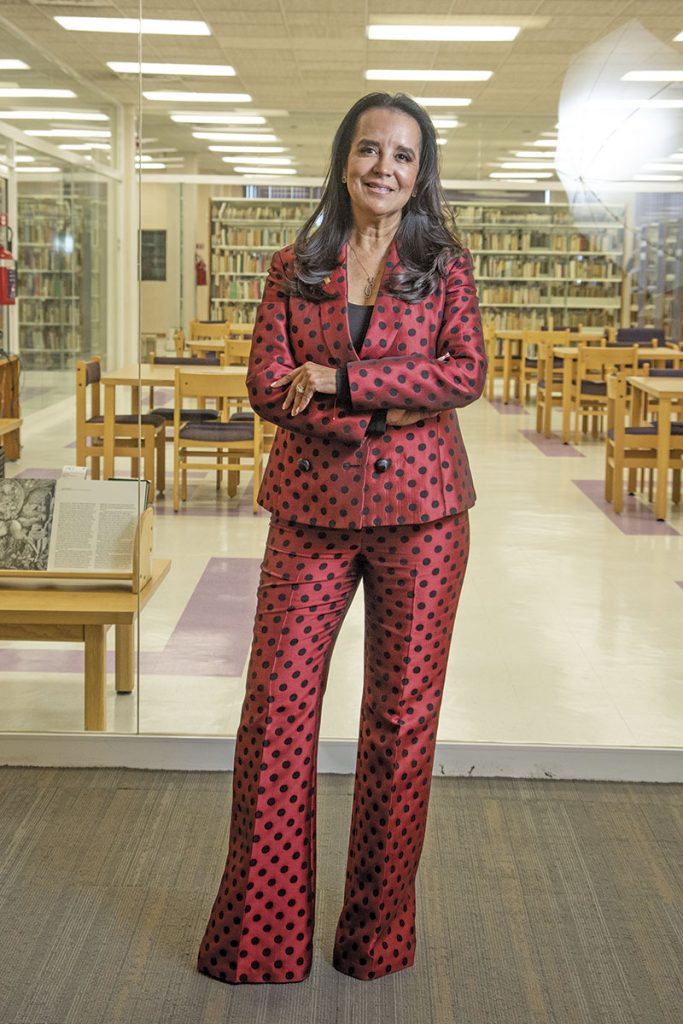
Change the lives of the most vulnerable
Through the UACJ, for 40 years, Gaby Acosta has been dedicated to bringing relief programs to the neediest areas of Juárez
“A woman who has no limits, a woman who sees beyond obstacles, who can solve problems and who has everything ahead of her” is Gaby Acosta’s description of a visionary woman, a concept she undoubtedly fits.
Gabriela Acosta Camacho is a social worker by profession who, for 40 years, has been involved in the affairs of the Universidad Autónoma de Ciudad Juárez (UACJ), her alma mater and the institution that has allowed her not only to be its representative before other institutions or important agencies but also to help those who need it most.
Gaby was born in Mexico City and came to live on this border very young, where she was part of the Teresian Latin American School. “It was a wonderful stage of my life that marked me to later choose this career (Social Work)… in the Teresiano they instilled in us the love for our neighbor”, shares who grew up in a very close family environment and is now the mother of two daughters, Sophia and Regina.
University, a new beginning
It was for this reason that when it came time to choose a career, Gaby decided without hesitation to choose Social Work, where she learned about the “sensitive side of the human being,” she says.
Because of her interest and desire to start helping that, in 1983, the university allowed her to work on its faculty, teaching subjects such as community. She was also a part-time researcher and later an academic-administrative assistant.
Acosta Camacho, who specializes in speech therapy, teaches group dynamics and techniques.
However, not everything has happened inside a classroom; in these 40 years, Gaby represented the UACJ in Mexico City, where she was in charge of coordinating, being liaison and manager before federal agencies and instances of higher education such as the SEP, Conacyt, Anuies, Conade, UNAM, ITAM, UAM, among others.
“I had another vision of what the university was really about; I had the opportunity to make several arrangements with higher education and government agencies,” she adds.
Close to the community
Upon her return to this city, she continued to support the school, but now as general coordinator of Public Relations, a job she did for two administrations; during that time, one of her achievements was the transfer of entire libraries to this border, among them Carlos Montemayor’s. She also managed the sales of UACJ books in prestigious bookstores.
“I think God put me where I had to be,” he says.
Currently, he continues to develop from the sub-directorate of Social Service and Community Action of the general direction of Extension and Student Services of the UACJ, where he has the opportunity to carry out and coordinate together with students of the social service area projects of approach with the most vulnerable and needy communities of the city.
They take multidisciplinary brigades to these communities, offering health, educational and cultural services. They bring health fairs to be primary and secondary schools in marginalized areas and give informative talks on bullying prevention, behavior and values.
They also bring together children in reading circles to try to improve their understanding, taste and culture. They also provide academic achievement programs through math tutoring for children. They are committed to preventing them from dropping out of school and motivating their intellectual development so that they can become university students in the future.
Likewise, in migration, it coordinates humanitarian aid programs and social, cultural, sports and health actions for people in mobility situations.
“With a little grain of sand, we have noticed great changes; the truth is that it has been many years, 40 years in this institution, and I still want to keep working; we are always discovering new problems; these never end … every day we prepare ourselves more, we get stronger to help all the people who need us,” says Gaby excited.
Rotarian at heart
But it doesn’t end there. Our interviewee has also been a member of the Rotary family for several years, joining as a Rotarian after marrying Jorge Mario Quintana Silveyra, who already belonged to the club.
She later chaired the Juárez Oriente Ladies Committee and is currently a member of the Juárez Conecta Transforma Club, with which she carries out volunteer activities to support vulnerable people, “we change lives,” says Gaby, for whom it is not enough because she says she would like to “work more for Ciudad Juárez,” for which she does not let go of her commitment.
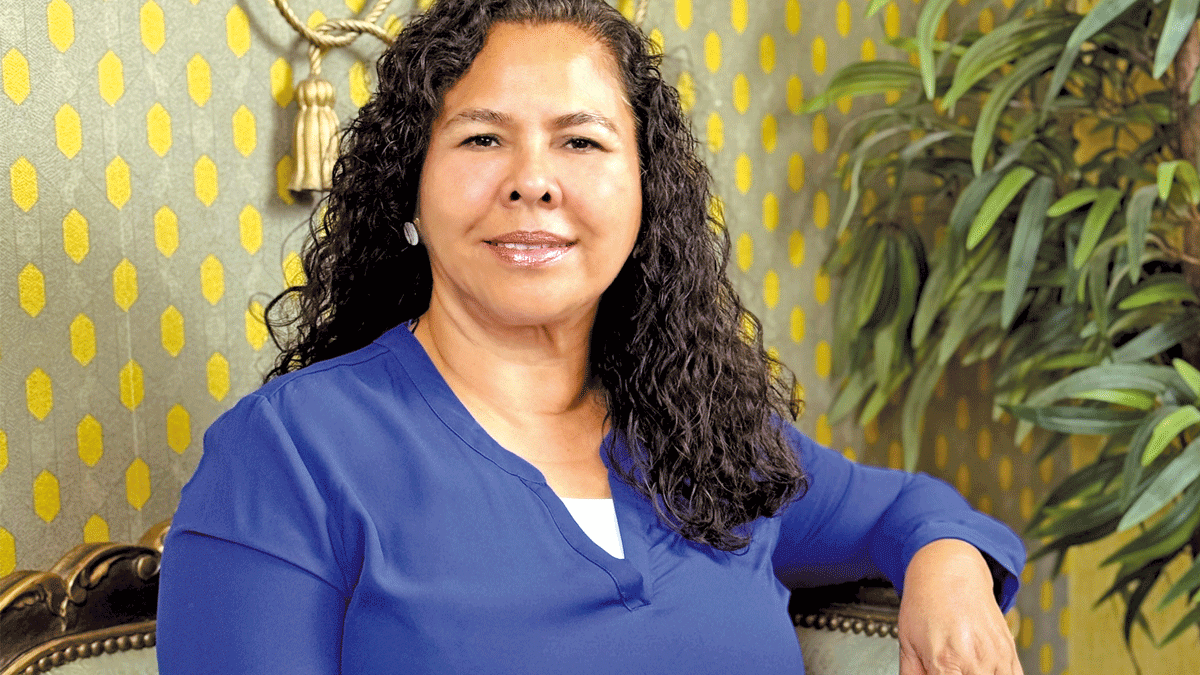
En una nueva etapa, la fundadora de Vida Integral para la Mujer A.C. cuenta sobre el trabajo que hace a favor de las víctimas de violencia y sus hijos
Con el objetivo de proteger y apoyar a mujeres víctimas de violencias extremas, así como a sus hijas e hijos, ofreciéndoles refugio, atención psicológica, asesoría jurídica y otras herramientas para salir adelante, es que fue creado Vida Integral para la Mujer A.C., que está comenzando una nueva etapa en su historia.
De la mano de su directora y fundadora, Lilia Aurora Pacheco, Vida Integral para la Mujer deja de percibir apoyos gubernamentales para así poder dar una ayuda espiritual libre a quienes se acercan en busca no sólo de protección, si no de un espacio donde puedan iniciar una vida normal, incluso tomar talleres que les sirvan para subsistir económicamente, siempre tomadas de la mano de Dios.
Lo anterior, nos cuenta Lilia, se pone en marcha a través de los grupos “A Corazón Abierto” de ayuda mutua y conocimiento en Cristo.
‘Creer en Dios’
Pero todo el trabajo que esta institución se realiza no es de hoy, han sido años de labor constante de una mujer visionaria, quien, tras superar el cáncer de tiroides hace más de dos décadas, decidió salvar a otras mujeres, siguiendo también el ejemplo de su madre Ofelia, “una mujer muy valiente, ella fue quien me enseñó a creer en Dios”, nos cuenta.
Por ella es que “estoy intentando por medio del refugio seguir salvando las vidas de las mujeres, los niños y las niñas que sufren violencia, y también a la comunidad”, comenta la madre de una hija y abuela de dos pequeños.
Refugio y centro externo
Lilia nos comparte que el trabajo en el refugio consiste en recibir a las víctimas en un lugar seguro, con una dirección confidencial, ya sea que lleguen por cuenta propia o canalizadas por medio de alguna fiscalía, hospital, iglesia o cualquier otra institución que sabe del trabajo que ellos realizan. Además, pertenecen a la Red Nacional de Refugios.
Las mujeres que se acercan padecen violencia desde física, económica, psicológica y hasta obstetra, que hasta no hace muchos años no era tomada en cuenta.
Otro de los ejes importantes de Vida Integral para la Mujer A. C. es el centro externo, ubicado en la colonia Salvárcar y abierto para ayudar a la comunidad en general en diversos temas, uno de ellos es el jurídico, para lo cual cuentan con abogados que dan seguimiento y acompañamiento en casos donde se requiera de asesoría legal.
“Por una vida que salves, salvas a una mujer y sus generaciones”, menciona nuestra entrevistada, quien también acepta que no siempre se logra el cometido, pues para algunas mujeres es difícil salir de la zona de agresión.
“Como mujer ha sido muy frustrante que la mujer no se valora, que tú les das tres seis meses de tu vida, contante, y si Dios no está ahí no puede abrir su entendimiento sola… Donde Dios no está no hay soluciones”, pero agrega que es por las historias de éxito es que ella continúa su labor.
Por ahora Lilia Pacheco continúa trabajando por el bien de las mujeres y sus hijos, en esta nueva etapa con el cobijo de Dios, quien dice ha sido bueno y ha tenido misericordia de ella, dice, “(sin él) no podemos hacer nada”, tal cual se lo enseñó su madre, quien también le hizo ver que es una hija de Dios.
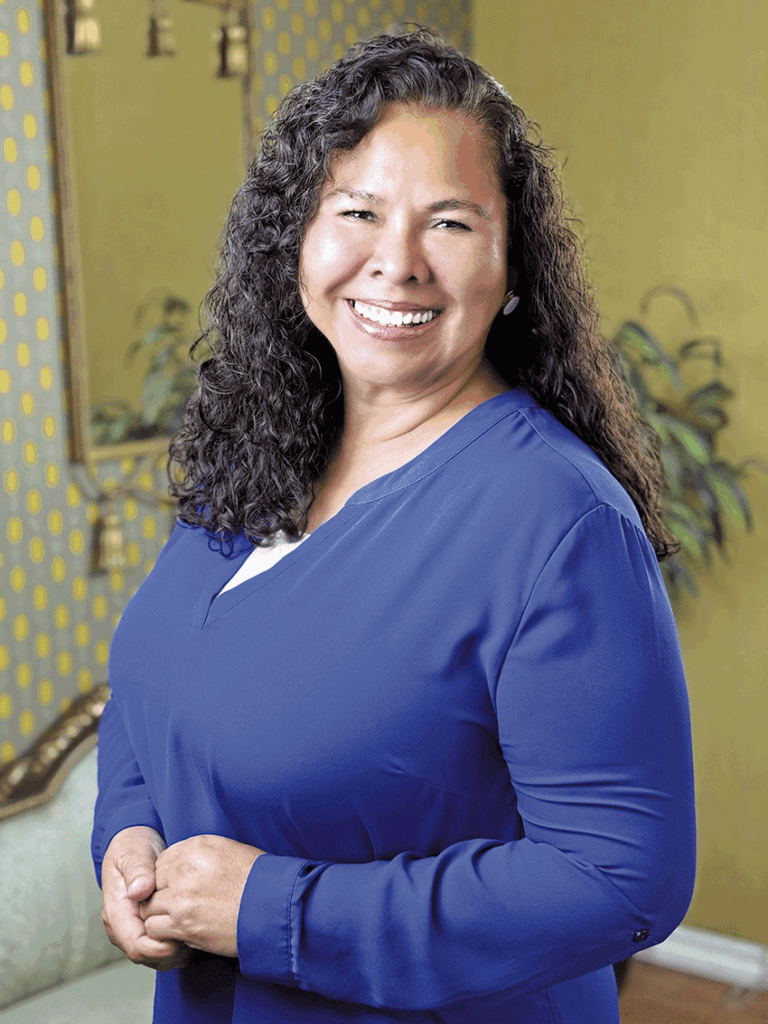
A Daughter of God
In a new chapter, the founder of Vida Integral para la Mujer A.C. shares the work she carries out to support victims of violence and their children.
With the mission of protecting and supporting women who have experienced extreme violence—as well as their daughters and sons—Vida Integral para la Mujer A.C. was created to offer shelter, psychological care, legal advice, and other tools to help them move forward. Now, the organization is entering a new stage in its journey.
Under the leadership of its director and founder, Lilia Aurora Pacheco, Vida Integral para la Mujer is stepping away from government funding in order to offer free spiritual support to those seeking not only protection, but also a space where they can begin a normal life. This includes access to workshops that help them become financially self-sufficient—always with their hand in God’s.
This new approach, Lilia tells us, is being carried out through the mutual support and faith-based learning groups called “A Corazon Abierto” (With an Open Heart).
‘Believing in God’
But this work didn’t begin yesterday. It has been years of continuous effort by a visionary woman who, after overcoming thyroid cancer more than two decades ago, decided to devote herself to saving other women—following the example of her mother, Ofelia.
“She was a very brave woman, and the one who taught me to believe in God,” Lilia tells us.
Because of her mother, “I’m trying—through this shelter—to continue saving the lives of women, children, and even the community,” says the mother of one daughter and grandmother of two young children.
Shelter and External Center
Lilia explains that the shelter’s work consists of welcoming victims into a secure and confidential location—whether they arrive on their own or are referred by prosecutors’ offices, hospitals, churches, or any other institutions familiar with their work. They are also a part of the National Network of Shelters in Mexico.
The women they serve experience many forms of violence: physical, economic, psychological, and even obstetric violence, a type that only recently has begun to receive recognition.
Another key component of Vida Integral para la Mujer A.C. is its external community center, located in the Salvarcar neighborhood. It serves the broader community, offering support on a variety of issues—one of the most crucial being legal assistance. The center has lawyers available to provide follow-up and accompaniment in cases requiring legal guidance.
“By saving one life, you save a woman and her generations,” says Lilia. She also acknowledges that not every case ends in success—some women struggle to leave the abusive environments they’re in.
“As a woman, it’s frustrating to see that some women don’t value themselves—that you give them three or six months of your life, constantly—and if God is not there, they cannot come to understand on their own… Where God is not present, there are no solutions,” she says. Still, it’s the stories of success that keep her going.
For now, Lilia Pacheco continues her work for the well-being of women and their children, in this new stage under God’s care—who, she says, has been good and merciful to her.
“Without Him, we can do nothing,” she affirms, just as her mother taught her—along with the truth that she is a daughter of God.
“In this world you will have trouble but take heart; I have overcome the world.”
John 16:33
El Diván
Innovación con propósito: la historia de Ramón Chávez y SPD
Publicado
1 mes antesel
03/06/2025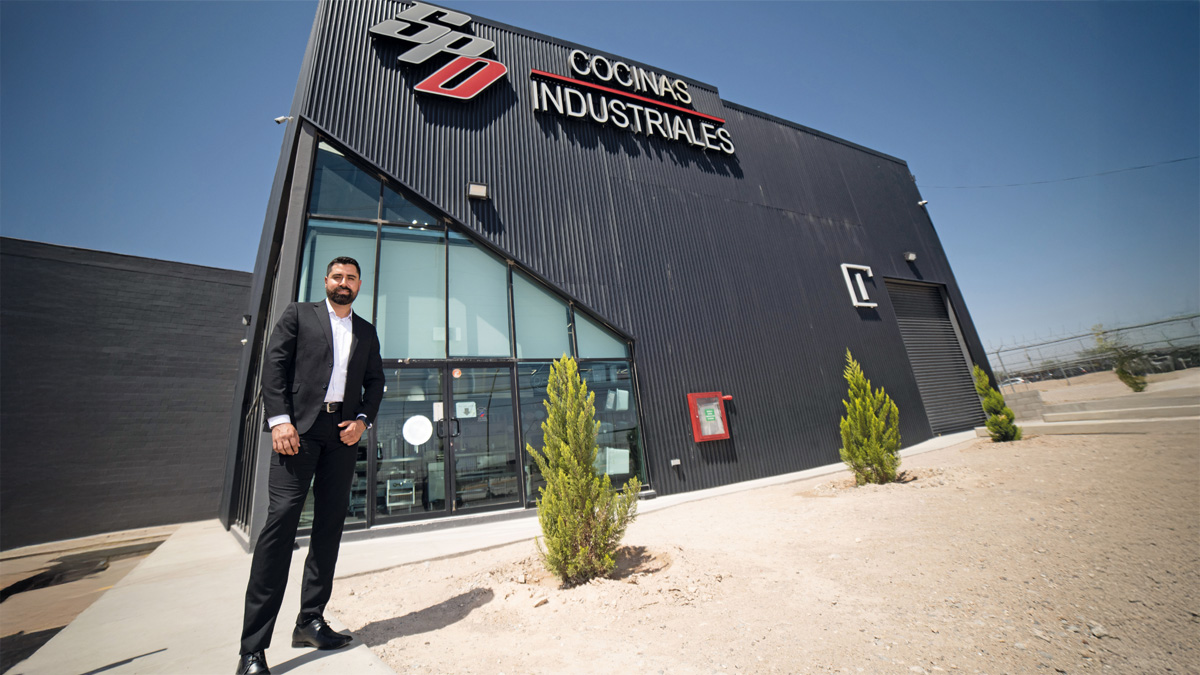
En el corazón de la industria alimentaria, donde la eficiencia, la seguridad y la innovación se entrelazan, SPD, Servicios Profesionales Diversificados, es una compañía que ha evolucionado desde ofrecer servicios de mantenimiento técnico, hasta convertirse en un referente en soluciones integrales para cocinas industriales, restaurantes y la industria hotelera.
Ramón Chávez, de 38 años de edad, originario de Parral, Chihuahua, es ingeniero electromecánico y empresario exitoso en nuestra frontera. Él junto a su socio Alfonso Santillan han logrado construir algo más que la empresa SPD, han dado forma a una visión compartida a lo largo de más de 20 años de trabajo constante.
Sin embargo, más allá del empresario, hay un padre y esposo que ha aprendido a equilibrar los retos del liderazgo, con su vida familiar. A su lado están su esposa, Yael y sus tres hijos: Ramón, René y Regina. Juntos forman un equipo unido, con valores firmes y una fe profunda en Dios, que los sostiene en cada paso.
“Mi mayor reto no ha sido construir una empresa, sino ser cabeza de hogar”, afirma con sinceridad.
Su fe en Dios, es su motor
Para Ramón, su fe en Dios es el motor que lo impulsa cada día y el fundamento sobre el cual ha edificado tanto su familia como su empresa.
Recientemente, en una charla con uno de sus hijos, le preguntó: ¿Qué crees que importa más, la fama o el dinero? él respondió con convicción: “Es mejor confiar en Dios, y lograrás todo en tú vida”. Esa respuesta refleja lo que Ramón ha sembrado: una vida guiada por la fe, con propósito y con identidad clara. Porque más allá del éxito empresarial, su verdadero legado es espiritual y humano.
Consejo para los hombres, cabeza del hogar
“A los padres, a los hombres que lideran un hogar: tengan identidad, no se confundan con lo que el mundo dicta. Tomen con valentía el lugar que les corresponde, no solo como proveedores, sino como líderes con propósito”, declaró.
Además, recomendó soñar en grande, pero con los pies en la tierra y el corazón puesto en las manos del Señor. Advirtió que no será fácil, pues habrá días de lucha, de dudas, de cansancio, pero todo es posible para él que cree.
“A su tiempo, todo llega. Y cuando llegue, entenderás que valió la pena poner toda tú confianza en Dios”, mencionó Chávez.
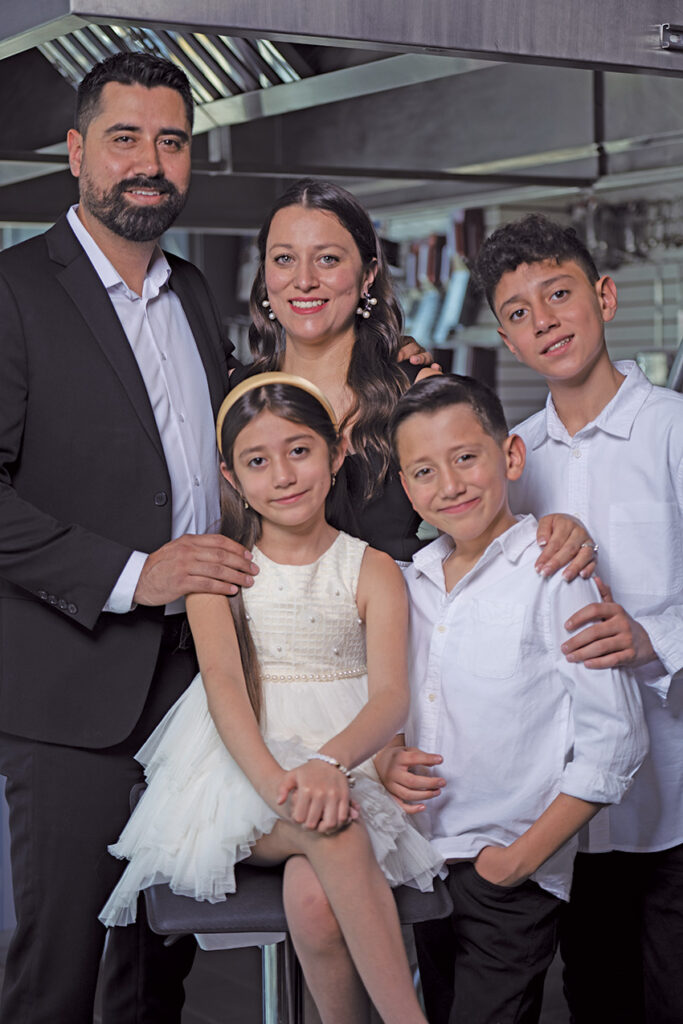
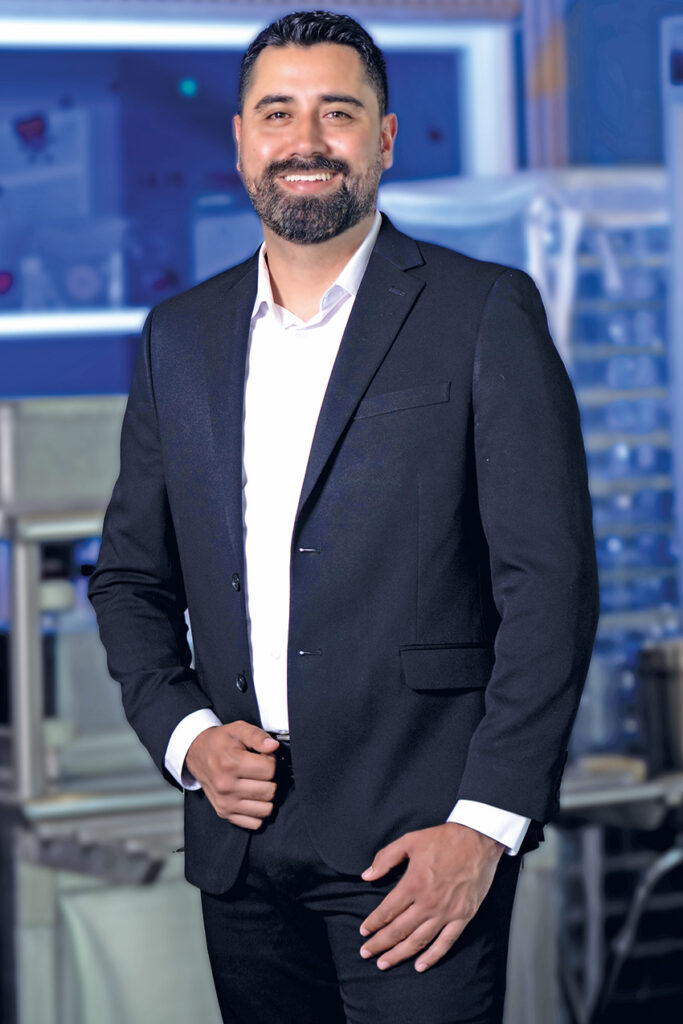
Innovation with Purpose: The Story of Ramon Chavez and SPD
At the heart of the food industry, where efficiency, safety, and innovation intertwine, SPD, Diversified Professional Services, is a company that has evolved from offering technical maintenance services to becoming a leader in comprehensive solutions for industrial kitchens, restaurants, and the hospitality industry.
Ramon Chavez, 38, originally from Parral, Chihuahua, is an electromechanical engineer and successful entrepreneur on our border. Along with his partner, Alfonso Santillan, they have managed to build more than just the company SPD; they have shaped a shared vision over more than 20 years of constant work.
However, beyond the entrepreneur, there is a father and husband who has learned to balance the challenges of leadership with his family life. By his side are his wife, Yael, and their three children: Ramon, Rene, and Regina. Together they form a united team, with strong values and a deep faith in God, which sustains them every step of the way.
“My greatest challenge hasn’t been building a business, but being the head of a household,” he says sincerely.
His Faith in God Is His Driving Force
For Ramon, his faith in God is the driving force that drives him every day and the foundation upon which he has built both his family and his business.
Recently, in a conversation with one of his sons, he asked him: “What do you think is more important, fame or money?” He replied with conviction: “It’s better to trust in God, and you will achieve everything in your life.” That answer reflects what Ramon has sown: a life guided by faith, with purpose and a clear identity. Because beyond business success, his true legacy is spiritual and human.
Advice for Men, Heads of the Household
“To fathers, to men who lead a home: have an identity, don’t be confused by what the world dictates. Courageously take your rightful place, not only as providers, but as purposeful leaders,” he declared.
He also recommended dreaming big, but with your feet on the ground and your heart placed in the hands of the Lord. He warned that it won’t be easy, as there will be days of struggle, doubt, and fatigue, but everything is possible for those who believe.
“In due time, everything comes. And when it comes, you’ll understand that it was worth it to put all your trust in God,” Chavez said.
El Diván
Judith Weber: Un corazón de servicio
Publicado
2 meses antesel
05/05/2025Por
Luz María Sotelo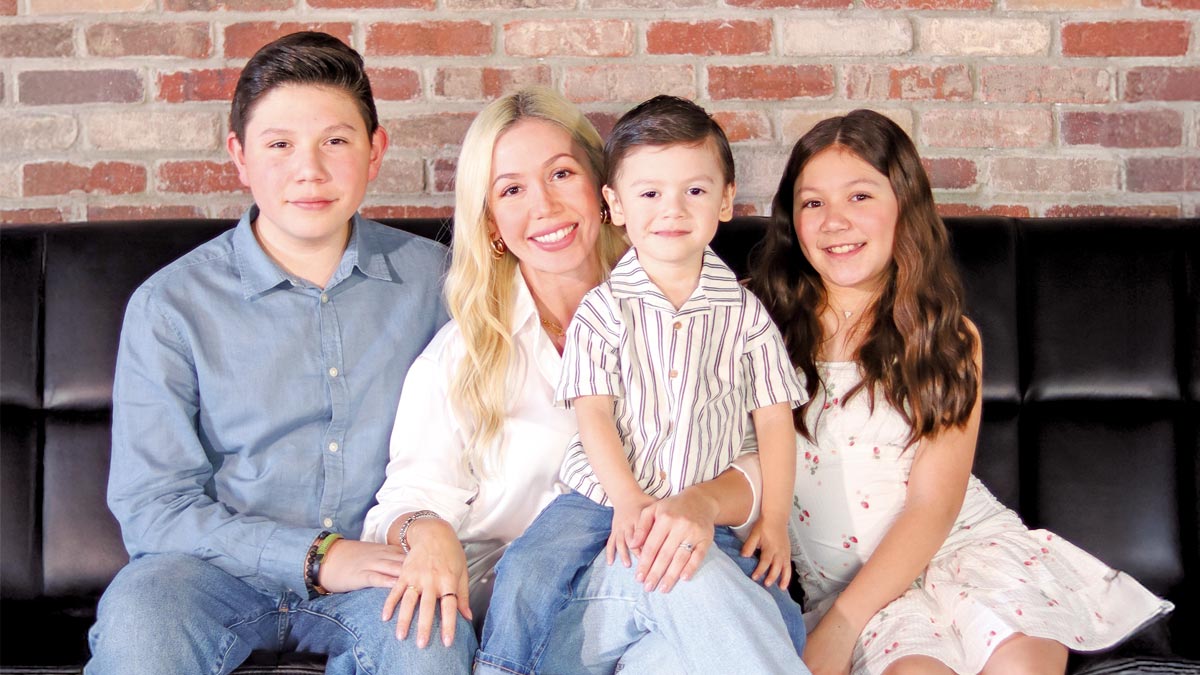
Nacida en el núcleo de una familia cristiana, esta Mujer Visionaria comparte el mensaje de Dios con la comunidad que ama
Con la bendición de nacer y crecer en un hogar cristiano, Judith Weber siempre ha caminado tomada de la mano de Dios, quien le ha dado la encomienda de formar una familia y ministrar una iglesia al lado de su compañero de vida, el pastor Rudy Weber.
En entrevista con Visionarias, Judith recuerda su vida al lado de sus padres y abuelo, un misionero que predicó la palabra hasta su último suspiro, además de su vida en matrimonio, la conexión con sus hijos y el trabajo con la comunidad que ahora ella también pastorea.
Juntos desde la infancia
Judith conoció a su esposo en la iglesia cuando ella tenía 13 años y cursaba high school, mientras él ya era un estudiante universitario, por lo que sólo lo veía como el hijo del pastor.
Fue al pasar de los años, cuando cumplió 18 y él 23 que comenzaron una relación amorosa en una primera etapa que únicamente duró tres meses, pues Rodolfo decidió terminar el noviazgo para enfocarse en el ministerio juvenil que lideraba.
Sin embargo, Dios tenía otros planes para la joven pareja, pues nueve meses después regresaron para durar 5 años de novios y luego dar el gran paso, casarse, de eso pronto se cumplirán 16 años.
Landen, Alessandra y Luka
A sus 38 años, esta Mujer Visionaria es madre de tres hijos.
El primero en llegar a la familia de Judith y Rudy fue Landen, quien hoy tiene 13 años y según su madre “es un niño muy noble, sonriente, ocurrente y tranquilo que piensa muy maduramente cuando se trata de las cosas de Dios”.
Luego nacería Alessandra, quien nos dice es una niña de 11 años muy fuerte y ayuda mucho en casa, “es una mamá chiquita, toma el rol de ayudarme en la casa con Luka, ella sabe sus necesidades, (y también) ama la iglesia”.
Y sobre Luka, Judith nos comparte que Dios lo mandó en el momento correcto, “es una luz en la casa” que hoy en día tiene 3 años.
“Ser mamá es la bendición más grande. Verlos crecer es algo muy especial”, dice.
“Los viernes son viernes de familia, ese día procuramos dedicárselo a ellos. Cine, cenar, estar en casa y ver películas, una carne asada, juegos de mesa; cada viernes algo diferente, pero escogemos hacer algo con ellos y pasar tiempo los cinco solos. Enfocarnos en ellos y darles el 100 por ciento de nuestra atención, esos días valen oro”.
Continúa, “aún sigo aprendiendo cómo navegar mi vida como madre, esposa y pastora… (Salmo 139:13-14) Mi meta como mamá es que amen a Dios por sobre todas las cosas y crezcan para ser personas que agraden a Dios en todo lo que hagan, recordarles quien es Jesús en nuestras vidas”, platica Judith.
Roca Church
Sobre tomar un papel más importante en el ministerio ella dice tener muchas respuestas, aunque sólo nos comenta que al principio únicamente estaba involucrada en la alabanza y los jóvenes, pero en el año 2020, durante el proceso de instalación como pastores principales de Roca Church, comenzó a sentir que Dios la llamaba más al ministerio.
“Me siento contenta de poder dirigir una iglesia, el llamado de pastorear no es para todos, es un llamado el de ser pastores, no es fácil, tenemos nuestras altas y bajas, nuestros tiempos buenos, nuestros tiempos malos, pero siempre nos agarramos de Dios para poder asegurarnos de que, estamos haciendo la voluntad de Dios”, menciona.
Dice que mientras ella está en la alabanza y ministra a su manera, su esposo es el que predica, “funcionamos con diferentes roles en el ministerio, pero estamos dirigidos a la misma meta… cumplir el propósito de Dios que es construir la iglesia”.
“Mi rol en la iglesia ahorita tiene muchos papeles, y está bien”, dice Judith quien se encarga de que los ministerios funcionen y los voluntarios tengan las cosas que necesitan, pues ella ayuda a que las cosas sucedan, teniendo la comunicación como su mejor herramienta, por lo que su nueva visión es crear comunidad a través de los grupos Conecta, para que esa misma gente traiga más personas que se unan a Roca, una familia convertida en iglesia.
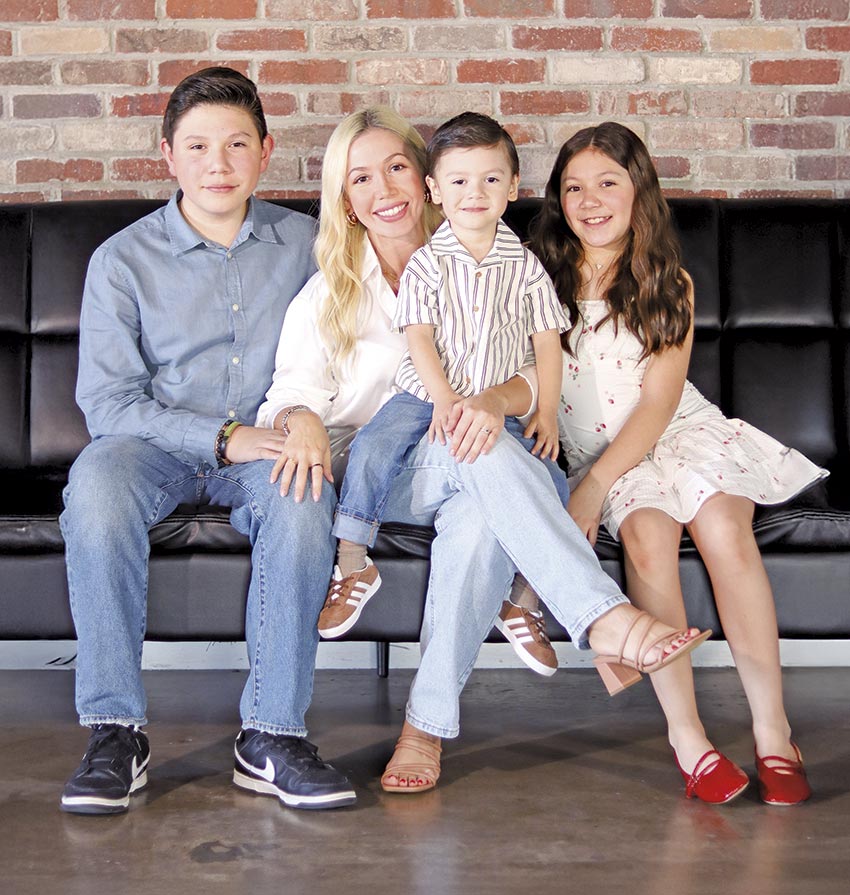
Judith Weber: A Heart of Service
Born into a Christian family, this Visionary Woman shares God’s message with the community she loves.
Blessed with being born and raised in a Christian home, Judith Weber has always walked hand in hand with God, who has entrusted her with the task of raising a family and ministering a church alongside her life partner, Pastor Rudy Weber.
In an interview with Visionarias, Judith recalls her life alongside her parents and grandfather, a missionary who preached the word until his last breath, as well as her married life, her connection with her children, and her work with the community she now also pastors.
Together Since Childhood
Judith met her husband at church when she was 13 and in high school, while he was already a college student, so she only saw him as the pastor’s son.
Over the years, when she turned 18 and he turned 23, they began a romantic relationship. Initially, it only lasted three months, when Rodolfo decided to end their relationship to focus on the youth ministry he led.
However, God had other plans for the young couple. Nine months later, they returned to courtship for five years and then took the big step: marriage. That will soon mark 16 years.
Landen, Alessandra, and Luka
At 38 years old, this visionary woman is the mother of three children.
The first to join Judith and Rudy’s family was Landen, who is now 13 years old and, according to his mother, “is a very noble, smiling, witty, and calm boy who thinks very maturely when it comes to the things of God.”
Then came Alessandra, who, she says, is a very strong 11-year-old girl and helps a lot at home. “She’s a little mom. She takes on the role of helping me around the house with Luka. She knows his needs, and she also loves church.”
And about Luka, Judith shares that God sent him at the right time. “He’s a light in the house,” and today he’s 3 years old.
“Being a mother is the greatest blessing. Watching them grow is something very special,” she says.
“Fridays are family Fridays. We try to dedicate that day to them. Movies, dinner, being home and watching movies, a barbecue, board games; every Friday something different, but we choose to do something with them and spend time just the five of us. Focusing on them and giving them 100 percent of our attention, those days are worth their weight in gold.”
She continues, “I’m still learning how to navigate my life as a mother, wife, and pastor… (Psalm 139:13-14) My goal as a mother is for them to love God above all else and grow to be people who please God in everything they do, reminding them who Jesus is in our lives,” Judith says.
Roca Church
Regarding taking on a larger role in the ministry, she says she has many answers. She only tells us that at first, she was only involved in worship and youth, but in 2020, during the installation process as senior pastors of Roca Church, she began to feel God calling her more to the ministry.
“I feel happy to be able to lead a church. The call to pastor is not for everyone; it’s a calling to be a pastor. It’s not easy. We have our ups and downs, our good times, our bad times, but we always hold on to God to ensure that we are doing God’s will,” she mentions.
She says that while she is in worship and ministers in her own way, her husband is the one who preaches. “We function in different roles in the ministry, but we are all headed toward the same goal… to fulfill God’s purpose, which is to build the church.”
“My role in the church right now has many roles, and that’s fine,” says Judith, who ensures that the ministries run smoothly and that volunteers have the things they need. She helps make things happen, using communication as her best tool. Her new vision is to build community through Conecta groups, so that those same people can bring more people to join Roca, a family that has become a church.



